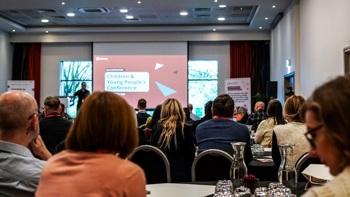
Andy Sparkes, Managing Director for Local Government, gave a brief introduction to attendees about what The Access Group does and who it does it for: supporting more than 45 NHS Trusts using our healthcare solutions, over 10,000 registered care providers across home care and care homes, and 200+ Local authorities with our Social Care, Education and Youth Services solutions.
With tight budgets, ever-changing legislation (especially since the introduction of a new government this year), and a competitive market for solutions, we wanted to showcase all that The Access Group has to offer local government through aspects such as workload efficiencies, greater oversight of care delivery, easier provider engagement, and return on investment – all things to help respond to the Department for Education’s new digital and technology vision.
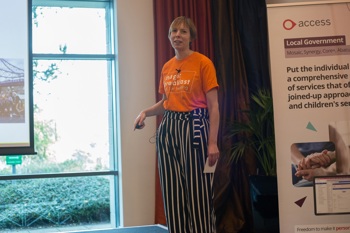
Session 1: Magic Breakfast
First up were Magic Breakfast; a charity organisation that The Access Group has worked closely with since 2023 to help provide crucial nutrition to youngsters to help fuel their bodies and minds so that they can achieve in school and take full advantage of their education.
Speakers Jenna Durdle and Sukhi McDonald introduced attendees to the principles of Magic Breakfast and the ongoing work they’re involved in; delivering breakfasts to almost 1,000 schools in England and Scotland, which is more than 200,000 children or young people every school day.
While the primary goal is to support children in receiving an education, Magic Breakfast’s pitch was angled at making new contacts, connections, and ideally onboarding engagement partners – to help support schools with breakfast provision so that they, and their pupils, have the best chance to succeed.
Sukhi raised an important point about “JAM families” – Just About Managing – and how these are the families slipping through the net when it comes to social care and a support network. There was also a strong focus on the cost of living crisis still ongoing, which has created funding shortages and staff cuts. This is impacting families and their incomes, but also schools and the delivery of services. Voluntary action is growing out of sheer necessity to plug the gap, and this is something Magic Breakfast is looking to spearhead. In their own words, “we shouldn’t exist but we do”, so they might as well make a success of it.
87% of Magic Breakfast’s partner schools believe the support provided has had a positive impact on educational attainment. If you think you could help deliver this vital support, get in touch via www.magicbreakfast.com.
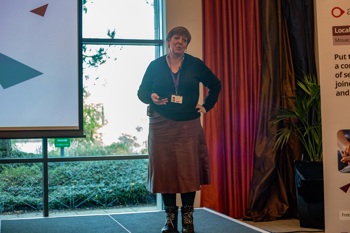
Session 2: Youth Justice Board
For our second talk of the day, Tracy Green of the Youth Justice Board (YJB) spoke to guests about the work that her organisation does in providing oversight for youth justice services.
A big part of Tracy’s talk focused on the digitisation that has been ongoing in recent years to optimise the YJB’s day-to-day operations and to utilise data collected about the way that youth justice services are serving and performing, in order to glean insights about how their operating practices or objectives can be tweaked to be more impactful.
‘Child First’ is the Youth Justice Board’s top priority, and thanks to the data analytics available in modern solutions the YJB are able to produce KPIs that demonstrate the community’s needs in a way that they couldn’t do 10 years or even maybe 5 years ago.
Tracy touched upon the AssetPlus assessment form, a mandatory tool for all post-court assessments, but the main talking point came around Prevention and Diversion. More YJB focus has drifted this way as fewer children are being hit with court orders and remanded in custody. 10 years ago this impacted around 2000 young people a year, but now that figure is down to 400 thanks to the earlier intervention work.
Anyone wanting to reach out to Tracy can find her at [email protected].
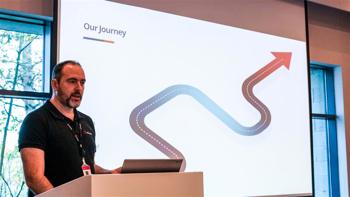
Session 3: Building for the Future
The returning Dan Wilkins, Product Manager at Access, delivered talk number 3 about how The Access Group is building for the future.
In his speech, Dan revisited his past work with Access Synergy – our education management suite – and the developments that were accomplished during his 20 years with Servelec and later Access. The point of Dan’s history lesson was the level of development achieved in the software solutions over the years, but also the evolution from simple to complex technology and how we still have a duty of care for the users, the customers, to make things easy to utilise in order to support their work.
With this in mind, Access has been focusing on user experience (UX) and how we can alleviate the burden of making customers shift data between our solutions, how we can find a happy balance between regular little updates or infrequent large ones, and the necessity of integration.
One update to our solutions will be the introduction of the Access button in the upper left corner of all applications, providing consistency and an easy access list of solutions within a suite, or modules within a solution.
The future, says Dan, is a gradual pivot to Software as a Service (SaaS), and the deployment of solutions via internet browsers rather than dedicated or standalone applications. This ‘Web First’ approach will continue to be interoperable and integrate with other Access or third-party solutions, and will be accompanied by Access hosting data rather than onsite data management by customers. This, in Dan’s words, will deliver greater scalability, better disaster recovery, and quicker deployment of a solution or module.
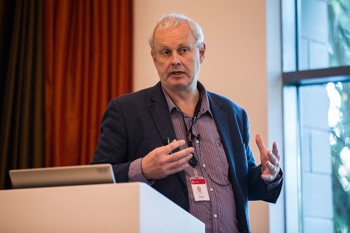
Session 4: Insightful and Meaningful Reporting
Stuart Ives, Product and Engineering Director for Local Government, delivered our final talk before lunch; not the fairest speaker slot given you’re battling with minds and stomachs, but Stuart gave a strong presentation on the benefits of data analytics for local government and the challenges currently being faced.
On his slides, Stuart chiefly flagged data siloing issues – a lack of communication between multiple systems. There was also the concern about data reporting being time consuming, limited, and inflexible, as well as issues around accessibility for key stakeholders. These limitations, alongside limited data analysis and insights, is a hindrance to local governments enhancing their operational efficiencies but also their service delivery and quality of outcomes.
The future, and the direction Access are pursuing, is Data as a Service (DaaS). You will recall we mentioned Software as a Service (SaaS) earlier, and this is a similar concept in the sense of wanting seamless delivery (of data, rather than a service), management, and access. The goal is to turn data into an accessible, shared asset, enabling faster decision-making, operational efficiencies and supporting educational outcomes.
200 or more local authorities use at least one of our products, but to keep these authorities engaged and satisfied with our services we need to keep improving and offering them more. Big Data is that incentive; insights, analytics, and trend assessments to help with forecasting, planning, and other strategies – but done in a way that it can feed from other connected solutions and feed back what it formulates.
As ever, Access will be consulting with existing and prospective customers alike for feedback on their needs and wants regards solutions and functionality, but the key point to stress about these tech enhancements is that it’s the same end results for the user, just done quicker.
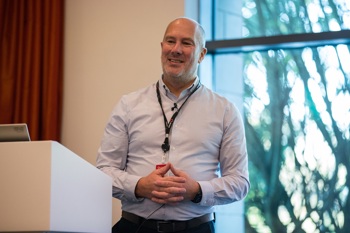
Session 5: Harnessing AI and Integration
First up after lunch was Jason Stevens, Head of Product. This was meant to be a double-header featuring Chris Wilson, Product Director Integrated Care, but unfortunately Chris couldn’t attend last minute and so Jason boldly stepped up to cover the three core topics within this session:
- AI and Access Evo
- Digital Voice Dictation & Integration
- IntelliCare
The crux of the talk was quite simple: AI is everywhere already, despite seeming to have had a very recent advent, what with machine learning and generative AI being involved in things such as autocorrect, social media, photography, search engines and their auto-complete function, and our little digital assistants.
While the environmental impact of AI is currently being assessed, ethics are perhaps the biggest concern at present, with fears over disguised use, breaches of privacy, biased decision making, a lack of explanation, and even the usage of incorrect of false data – some of which may have been generated by a different AI solution.
Fortunately, thanks to the expert help of Access personnel such as Alan Payne, we are prepared for the challenge of ethics within our AI developments. Alan, for context, is the Group Product and Engineering Director for the Health, Support & Care, but he also holds an Honorary Professor in Intelligent Systems specialising in AI, Digital Health, Healthcare systems and Entrepreneurship, giving guest lectures at University College London (UCL) and speaking at the Oxford Lectures from time to time.
Alan’s expertise has helped us establish an Ethical AI Guild to ensure best practice and to have the proper oversight, and that has given us the foundations to develop Access Evo.
What is Access Evo, we hear you cry? It’s an Evo-lution (ha) of all existing software solutions, introducing AI as an aide within these programs to support the delivery of work; whether through streamlining actions or providing support regarding how to perform a task.
Access Evo will be powering the Access Feeds, our update and alert list to help you prioritise tasks, as well as things such as our Digital Dictation tool and IntelliCare – our overarching platform to connect solutions, data and communication to avoid any siloing effect in future.
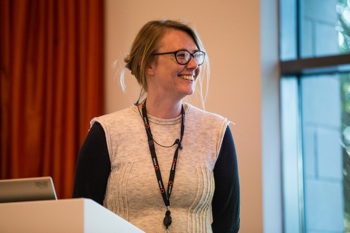
Session 6: Core+ Update
As the afternoon progressed we had a few quick solution updates, the first delivered by Erica Blagg – Product Owner for our Core+ software.
For the uninitiated, Core+ is a web-based, single database solution for Integrated Youth Support. It provides a database, reporting, analytics and communication tools for Children’s Services Departments and Organisations.
Core+ has resolved 120 bugs, integrated data management, introduced a new Prevention and Diversion Assessment for youth justice purposes, and integrated Wootric – a third-party customer feedback platform. On top of this there has been a user interface overhaul for clearer visuals, and further development will be delivered in the form of the Access Evo optimisations.
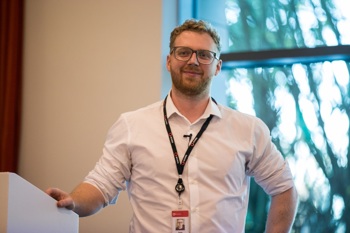
Session 7: Early Years Update
Sam Chatburn-Jones hosted our seventh talk of the day, discussing updates to our Early Years support through Access Synergy.
Again, to provide context, Access Synergy features an Early Years Funding tool. This provides Local Authorities with a powerful suite of products to support essential services. It is part of the Synergy suite of integrated Children’s Services Management Information Systems, providing a holistic view of all local interactions with children, young people, and families.
A timeline on Sam’s slideshow stated:
- Early Years census will return in January 2025
- Early Years Entitlement changes will be introduced in April 2025
- Start of 30 hours for 9 month to 5-year-olds working family entitlement changes will be introduced in September 2025.
Access will also be enhancing funding export, to enable local authorities to separate out different funding streams within the different funding types, but in the present we have just launched the new Provider Portal update. This now makes the portal available on mobile devices at long last. Further updates to incorporate Access Evo will also be added to the 2025 timeline.
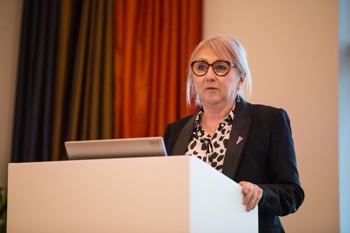
Session 8: Voice of the Child - Mind Of My Own
Yvonne Anderson, Founder and Director of Mind Of My Own, spoke in a session titled Voice of the Child; a segment about the importance of encouraging children to speak up about their needs, their fears, and any issues regards care or support.
Mind Of My Own runs a communication app designed for young people – typically 8-17 year olds – as a way of getting their honest thoughts and feelings across in ways that either they can’t articulate or feel like they shouldn’t speak.
The app, known as the One App, is also utilised by a child’s assigned key worker, so that they can take insights into a child’s personality but also their mindset; what’s causing them concern or worry? What gives them hope or happiness?
Yvonne’s talk highlighted how 450 plus services within councils, independent providers, schools and voluntary organisations are utilising the One App for child support and safeguarding, and since 2022 this has seen 93% of local authority community members improve their Ofsted scoring.
For practitioners, there’s a lot of support for the Education, Health and Care Plan (EHCP), but the benefits to the children are more important: essential data and insights into their needs and wants, their hopes and fears. Feedback on services, better evidence on views as a whole, and safeguarding through safe reporting channels.
For more information, or to discuss further collaboration with Yvonne, please email [email protected].
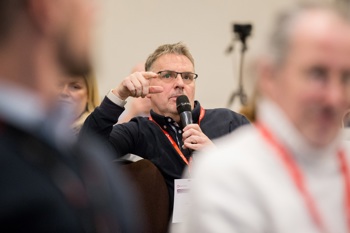
Session 9: SEND and AP Improvement Plan
Sam Chatburn-Jones clearly wasn’t satisfied with just one talk and came back for Round 2, this time to talk about special educational needs, education, health and care (EHC) plans, and Alternate Provision improvement plans.
There are 1.2 million pupils in England receiving SEN support in 2024. This is up 4.7% on 2023, and highlights the importance of an efficient and effective workflow – something Access Synergy supports.
176,321 pupils in UK have their EHCP managed by a Synergy local authority, whilst 500,000 pupils in UK are SEN support managed by Synergy. Our solution is popular, but there is more we can and are doing.
Our action plan is to work with the Department of Education to further enhance the standardising and digitising of Education & Health Care Plans. We also want to do more with early identification in Early Years settings and the transition to adulthood. A bit of honesty in the speech from Sam was that, at present, Synergy has mediocre visibility of the EHCP process – something the development team are addressing as we speak to align with the national expectations and regulations, as well as to support customers with access, troubleshooting, compliance and data sharing.
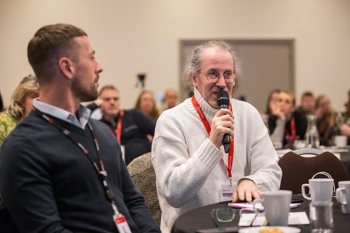
Thus our CYP conference was concluded, with thanks to all speakers for their insightful talks on a range of topics and solutions, but especially for our customers – pictured above – who were all very engaged and involved in discussions throughout the day.
Whether during a Q+A session or talks themselves, people showed passion and thought as they picked our brains on a myriad of points regards service delivery, support, and technological advancement, and we thank everyone for their input as it’s these engagements that allow us to spot opportunities or reassure customers about work in ways we might have overlooked.
For more information, please contact [email protected], or get in touch with your Account Manager.
